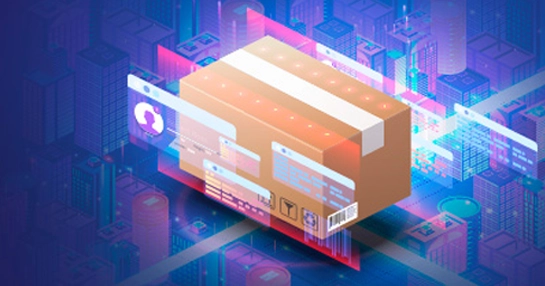Supply chain platforms have been helping enterprises to automate tasks, optimize inventory, plan transportation routes, and predict demand for quite some time, but there still have been silos that enterprises wish did not exist. With artificial intelligence or AI in supply chain, enterprises have gained a high degree of accuracy with everyday supply chain tasks and much more.
Artificial intelligence — from an industry jargon to evolving into its next-generation avatar with expanding capabilities — will continue to transform the way businesses operate. AI can systematically and microscopically analyze large chunks of data to detect patterns and trends. AI can make deeper sense of data from multiple sources — such as historical sales figures, inventory levels, transportation data, and also customer data — and make precise predictions. Furthermore, the algorithms within these systems can provide precise recommendations for businesses so that they can improve or overhaul their supply chain operations.
Artificial Intelligence in Supply Chain Benefits
The multifaceted capabilities of AI are helping businesses restructure the way they navigate the complications of supply chains. The integration of AI into supply chain operations is a strategic essential and no longer an optional good-to-have capability. Let’s take a quick look at the benefits of AI software technology in supply chain.
Cost Reduction
The implementation of AI technology — with its complex algorithms and predictive analytics — streamlines supply chain operations and helps businesses in identifying inefficiencies and cost-saving opportunities with surgical precision.
Efficiency Improvement
Automation of routine tasks — coupled with AI-driven decision support tools — elevates overall operational efficiency, enabling supply chain organizations to navigate complexities with unprecedented speed.
Real-Time End-To-End Visibility
AI's real-time monitoring and data analytics grant businesses an unparalleled level of visibility into the entire supply chain, fostering a proactive approach to challenges and opportunities.
Decision-Making
AI can empower decision makers within the organization with data-driven insights, enabling strategic, informed choices that can have a direct impact on the supply chain's performance.
Risk Mitigation
AI can predict, identify, and mitigate supply chain risks with precision and therefore ensure a resilient supply chain operations capable of navigating disruptions with agility.
How AI Makes a Difference in Supply Chain
AI has emerged as a transformative force in the supply chain domain in multiple aspects of supply chain management, including:
Demand Forecasting
AI, armed with historical data and advanced algorithms, predicts demand with precision, revolutionizing inventory management and eliminating the pitfalls of overstocking or understocking.
Inventory Management
Optimizing inventory levels through AI-driven analytics results in reduced holding costs and improved customer satisfaction, as businesses stay agile in responding to market volatility.
Transportation Planning
AI can refine routes and schedules based on real-time data, weather conditions, and fuel costs, ultimately enhancing supply chain efficiency and reducing costs.
Quality Control
In terms of quality assurance, AI can swiftly inspect and identify defects in order to ensure that products meet rigorous standards, contributing to enhanced product quality and reduced waste.
Implementation Challenges of AI in Supply Chain
AI has the potential to deliver significant benefits to businesses that adopt it. Businesses can maximize the chances of success by understanding and addressing the implementation challenges, including the following aspects:
Data Quality and Availability
AI models heavily rely on the quality and completeness of the data they are trained on. Inaccurate or incomplete data can compromise the accuracy of AI-generated results. Moreover, the substantial data requirements for training AI models pose a particular challenge for smaller businesses with limited resources.
Integration with Legacy Systems
Many businesses still operate using legacy supply chain systems that lack compatibility with AI technology. This disparity makes it challenging to seamlessly integrate AI solutions into established supply chain workflows, hindering the potential for a harmonious transition.
Cost and Complexity
The development and implementation of AI software solutions come with a significant financial investment. The complexity of managing and maintaining AI systems further adds to the overall costs, making it a substantial consideration for businesses evaluating the adoption of AI in their supply chain operations.
Lack of Skilled Workers
A shortage of skilled professionals with expertise in developing, implementing, and managing AI solutions poses a considerable obstacle. Finding the right talent is essential for businesses looking to leverage AI effectively in their supply chain, and the scarcity of qualified individuals can impede progress in adopting AI technologies.
Ethical Concerns
Deployment of AI in supply chains has raised ethical concerns. There’s a big worry about the potential for AI to automate jobs, leading to unemployment. Some have expressed concerns about the possibility of discriminatory practices against certain groups. Addressing these ethical considerations is vital to ensuring responsible and equitable AI adoption in the supply chain.
What are the Steps to Prepare a Supply Chain for AI?
Preparing a supply chain for AI implementation requires a structured approach that addresses technological, organizational, and strategic dimensions simultaneously.
Begin with a comprehensive data assessment to evaluate quality, accessibility, and completeness across supply chain systems. Identify critical data gaps that could undermine AI effectiveness, particularly around master data management, demand signals, and inventory accuracy. Implement data governance processes to ensure ongoing data integrity through clear ownership and quality standards.
Develop a clear problem statement that articulates specific business challenges AI will address. Avoid a technology-first approach that lacks defined business outcomes. Quantify potential value through financial modeling that considers both direct benefits (cost reduction, working capital improvement) and indirect impacts (service enhancement, risk mitigation).
Cross-functional alignment represents another critical preparatory step. Establish a steering committee or a panel with representation from supply chain, IT, finance, and operations to ensure enterprise-wide support. Conduct stakeholder mapping to identify potential resistors and champions, developing targeted change management strategies for each group.
Technical infrastructure preparation involves evaluating existing systems against AI requirements. This assessment should consider processing capabilities, integration mechanisms, and security protocols. Many organizations implement cloud-based platforms specifically designed for supply chain analytics as a foundation for AI initiatives.
Talent development addresses perhaps the most significant barrier to successful AI implementation. This preparation includes developing internal data science capabilities while enhancing domain experts' analytical literacy. Creating hybrid teams that combine technical expertise with operational knowledge typically yields better results than isolating data scientists from business units.
Establish a governance framework before deploying AI solutions, addressing ethical considerations, decision rights, and transparency requirements. Furthermore, document how algorithms make recommendations and define appropriate human oversight for different decision categories based on impact and risk.
Finally, develop an implementation roadmap that prioritizes use cases based on value potential and implementation complexity. Begin with narrowly scoped pilot projects that demonstrate clear ROI while building organizational confidence. These initial successes create momentum for more ambitious initiatives while providing valuable implementation learnings.
Organizations that systematically address these preparatory steps significantly increase their likelihood of achieving sustainable value from supply chain AI implementations.
Examples of AI in Supply Chain
AI applications deliver transformative capabilities across the supply chain, addressing longstanding challenges with unprecedented precision and adaptability.
AI in demand forecasting excels at incorporating non-traditional data signals to improve prediction accuracy. A scenario where this proves particularly valuable is seasonal product launches affected by weather patterns, social media sentiment, and macroeconomic factors. By analyzing these complex relationships, AI can detect early demand shifts that traditional forecasting methods might miss — enabling more responsive inventory positioning and reducing both stockouts and excess inventory.
For procurement operations, AI enables intelligent sourcing through real-time market analysis and should-cost modeling. When commodity prices fluctuate rapidly, AI systems can continuously evaluate optimal buying strategies, suggesting when to activate spot purchases versus long-term contracts based on predicted price trajectories. This capability helps organizations optimize spending while ensuring supply continuity in volatile markets.
Transportation networks benefit significantly from AI optimization. In scenarios involving multi-stop deliveries across congested urban areas with time-window constraints, AI algorithms can evaluate thousands of routing permutations while incorporating real-time traffic conditions. The resulting optimized routes significantly reduce fuel consumption, vehicle wear, and late deliveries compared to static routing approaches.
Warehouse operations represent another high-value application area. AI-powered systems can dynamically allocate storage locations based on predicted picking patterns and order profiles — reducing travel time and improving throughput. During peak seasons, these systems constantly recalibrate slotting as demand patterns shift, maintaining operational efficiency despite volume fluctuations.
In manufacturing environments, AI excels at quality assurance through computer vision. For production processes where defects present subtle visual signatures that human inspectors might miss, AI detection systems can identify anomalies with remarkable consistency. This capability proves particularly valuable for high-value components where quality failures create significant downstream costs.
Supplier risk management benefits from AI's ability to synthesize diverse data streams. During geopolitical disruptions affecting global supply chains, AI systems can assess potential impacts by analyzing news feeds, logistics data, and supplier communications simultaneously. This integrated view enables proactive mitigation strategies before disruptions affect production.
How does AI in supply chain work?
Artificial intelligence transforms supply chain operations with the help of multiple mechanisms, each leveraging advanced computational capabilities to augment human decision-making. At its core, AI in supply chain works by analyzing vast datasets from disparate sources — historical transactions, IoT sensors, market indicators and weather patterns — identifying complex relationships that drive operational outcomes.
Machine learning algorithms continuously improve through exposure to new data, enabling increasingly accurate predictions of demand patterns, lead time variability, and potential disruptions. These predictions power more sophisticated planning capabilities, reducing forecast errors by about 20-30% when compared to traditional statistical methods.
Natural language processing or NLP enables systems interpret unstructured data from supplier communications, customer feedback, and industry news, extracting insights that inform risk assessments and market intelligence. This capability extends to cognitive procurement assistants that automate routine inquiries and document processing.
Computer vision applications monitor warehouse operations , production quality, and transportation conditions, providing real-time visibility into physical processes. These systems can identify inventory errors, detect product damage, and optimize space utilization without human intervention.
Prescriptive analytics perhaps represents the most transformative capability, moving beyond predictions to generate specific recommendations for inventory placement, transportation routing, supplier selection, and production scheduling. These recommendations consider multidimensional constraints and objectives simultaneously, delivering solutions that human planners might overlook.
However – effectiveness of AI in supply chain depends critically on data quality, contextual understanding, and integration with existing processes. Leading organizations implement AI through a hybrid approach that combines algorithmic intelligence with human domain expertise, leveraging each for their respective strengths while establishing appropriate governance to ensure responsible deployment.
Getting Started with AI
After going through the steps of understanding the challenges and capabilities of AI, the final step for an enterprise is to integrate AI into its operations. But that’s easier said than done. Although AI is a transformative force, enterprises need a clear-cut plan and rock-solid underpinning to implement and move ahead with AI. These are indeed small steps, but they may enable enterprises to take a quick leap:
Start Small
Enterprises that have a fairly complex supply chain ecosystem could have multiple blind spots and therefore they shouldn’t try to implement artificial intelligence across the entire supply chain all at once. It’s better to start with a small pilot project and then scale up as the enterprise gains experience.
Start with a Clear Plan
Prior to implementing any AI solution, enterprises need to have a clear plan for how the technology will be used and how it will be integrated into existing workflows.
Invest in Data Quality
AI models are only as good as the data they are trained on or receive as input for analysis. It is therefore important to invest time and effort in ensuring data quality, such that the data is accurate and complete.
Partner with Experts
If there is no in-house expertise to develop and implement AI solutions, enterprises need to consider partnering with an AI vendor or take the help of supply chain consulting services for a complete assessment.










